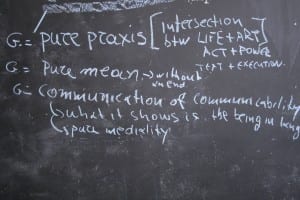Notes on Gesture : Giorgio Agamben
Etymologically gesture is defined as a word that comes from Medieval Latin gestura (“a mode of action”), from Latin gerere (“to bear, reflexive bear oneself, behave, act”), past participle gestus.
In philosophy:
“By the end of the nineteenth century, the gestures of the Western bourgeoisie were irretrievably lost”:Giorgio Agamben (1992- essay, “Notes on Gesture.”
According to Agamben at some point nervous and frantic gestures became the norm so that “everybody had lost control of their gestures and was walking and gesticulating frantically.” The loss of gesture coincided with the emergence of the cinema and the overwrought effort to reconstitute the vanished realm of meaningful movements and to recover or record what has been lost. In cinema the gesture is its basic expressive element. Especially silent cinema will be the primary medium for striving to evoke gesture in the process of loss.
Deleuze will break down the image to movement-image.
According to Agamben the gesture is: a type of action (Varro) but it’s neither about making (facere), producing or action (agere) but instead it is about enduring and supporting. It’s not a means in view of an end nor without a means. It’s a means as such.
“Hand Catching Lead” [1968]



